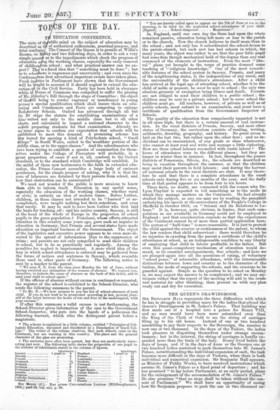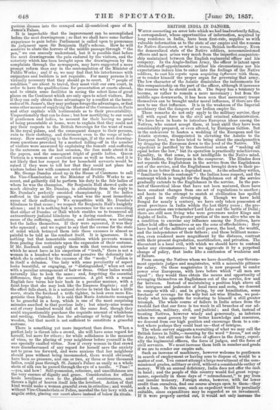THE QUEEN'S DRAWINGROOM, Srn BENJAMIN Ham, represents the three difficulties
with which he has to struggle in providing space for the ladies that attend the Queen's Drawingroom in St. James's Palace. That building was first made out of a hospital into a palace for Henry VIII, and no man would have been more astonished even than the King of the Cloth of Gold to see the string of carriages filing up to his old house. Instead of one or two hundred assembling to pay their respects to the Sovereign, the number is now one or two thousand. In the days of the Tudors, the ladies took pleasure in disguising themselves under strange encumbrances; but in the interval, the string of carriages is hardly expanded more than the train of the lady. Henry lived before the days of hoops, and if in the days of Anne or the Georges one or two hundred ladies contrived to pack themselves into St. James's Palace, notwithstanding the individual expansion of each, the task becomes more difficult in the days of Victoria, when there is both individual and numerical expansion. Sir Benjamin Hall appears, as Minister of Public Works, to have received instructions which assume St. James's Palace as a fixed point of departure ; and he has promised "to lay before Parliament, at an early period, plans for the enlargement of the accommodation of St. James's Palace." He also promises "that no steps shall be taken without the consent of Parliament." We shall have an opportunityof seeing how Sir Benjamin proposes to pack the one or two thousand ea pacious dresses into the cramped and ill-contrived space of St. James's Palace.
It is improbable that the improvement can be accomplished before the next drawingroom ; so that we shall have some further experience to gain before Parliament is called upon to pronounce its judgment upon Sir Benjamin Hall's scheme. How he will contrive to abate the horrors of the middle passage through "the pen," we can scarcely understand, but it is possible that before the next drawingroom the pain endured by the visitors, and the notoriety which has been brought upon the drawingroom by the complaints through the newspapers, may have suggested a more prompt reform than any in the contemplation of the Minister of Public Works ; and if so, we may find that his interference with carpenters and builders is not requisite. For many persons it is virtually necessary that they should go to court. If "people of condition" are about to travel, they must visit our own court, in order to have the qualifications for presentation at courts abroad, and to obtain some facilities in seeing the select lions of great places on the Continent which are only open to select visitors. But if they can only obtain those advantages by a conflict at the barricades of St. James's, they may perhaps forego the advantages, or find some, other means of supplying the Master of the Ceremonies in Paris and other capitals with testimonials as to their presentability. Unquestionably that can be done ; but how mortifying to our court if gentlemen and ladies, to account for their having no proof of being presentable at home, were to 'explain that they could not pay their respects to the British Sovereign for the want of room in the royal palace, and the consequent danger to their persons, ruin to their clothing, and detriment even to the verge of indecency. How mortifying to the Sovereign, if at the next drawingroom questions provoked by a marked falling-off in the number of visitors were answered by explaining the tumult and-suffering in the anteroom on the last occasion, the fuss made about it in the papers, and the consequent fright of gentle ladies. Queen Victoria is a woman of excellent sense as well as taste, and it is not likely that her respect for her household servants would be raised if they were to tell her that they could not place her visitors before her with common order and decency. Mr. George Dundas stood up in the House of Commons to call the Vice-Chamberlain or the Minister of Public Works to account, and gallantly did he perform his duty to the fair ladies of whom he was the champion. Sir Benjamin Hall showed quite as much chivalry as Mr. Dundas, in abstaining from the reply to Mr. Dundes's perfectly onesided championship. If the ladies suffered in the middle passage, what was the most immediate cause of their suffering ? We sympathize with Mr. Dundas's blindness to that cause ; we respect Sir Benjamin Hall's knightly silence.; and it is nothing-but a reverence for the sex exceeding that either of Dundas Hell which enables us to transcend all extraordinary judicial blindness by a daring candour. The real cause of the suffering, mutilation and indecorum, was nothing but the ladies themselves. If they were squeezed, it was they who squeezed • and we regret to say that the excuse for the state of mind 'which betrayed them into these excesses is almost as painful to be told as the conduct itself. It is ignorance. It is nothing but that lamentable condition which prevents women from placing due restraints upon the expansion of their costume. If Mr. Roebuck could supply them with that veracious mirror which he must have in his emporium of "truth," there is not a woman in a hundred who would not perceive the deformity into which she is enticed by the excesses of the "mode." Fashion is in itself a delusion. One lady with some peculiarity of aspect looks beautiful, or engaging, or "distinguished," when set out with a peculiar arrangement of hair or dress. Other ladies would naturally like to look the same ; and, forgetting the essential differences, they adopt the accessories. A girl with a round English face turns her hair back in a peculiar manner, with a faint hope that she may look like the Empress Eugenic; and if i the effect falls short, it s a natural device to twist the hair a little snore, strain the forehead a trifle tighter, to look even more Eugenistic than Eugenie. It is said that Marie Antoinette managed to be graceful in a hoop, which is one of the most surprising miracles ascribed to that peerless lady; but ninety-nine women out of every hundred would fail at the same feat, though they could unquestionably purchase the requisite amount of whalebone and cording. Crinoline has the advantage of being rather less wooden, but that merit is not sufficient to constitute a graceful costume.
There is something yet more important than dress. When a perfect lady is thrust into a crowd, she will have some regard for herself, but more for others ; for while selfishness is the meanest of vices, so the placing of your neighbour before yourself is the one specially exalted virtue. Now if every woman in that crowd were disembarrassed of any regard for herself save the anxiety not to press too forward., and were anxious that her neighbour should pass without being incommoded, there would obviously have been no pressure and one or two, ay three or four thousandladies, could pass through St. .Tames's Palace as easily as a whole
skein of silk can be passed through the eye of a needle. " Pass ! " —yes, and how Self-possession, reticence, and unselfishness are the very essence of dignity and grace. Consideration for others lends loveliness even to the plainest of countenances and throws a light of heaven itself into the loveliest. Action Of that kind would make a woman graceful even in crinoline ; and would, without Vice-Chamberlain or Police, marshal the fair bevy with an angelic order, placing our court above instead of below its rivals.



























 Previous page
Previous page